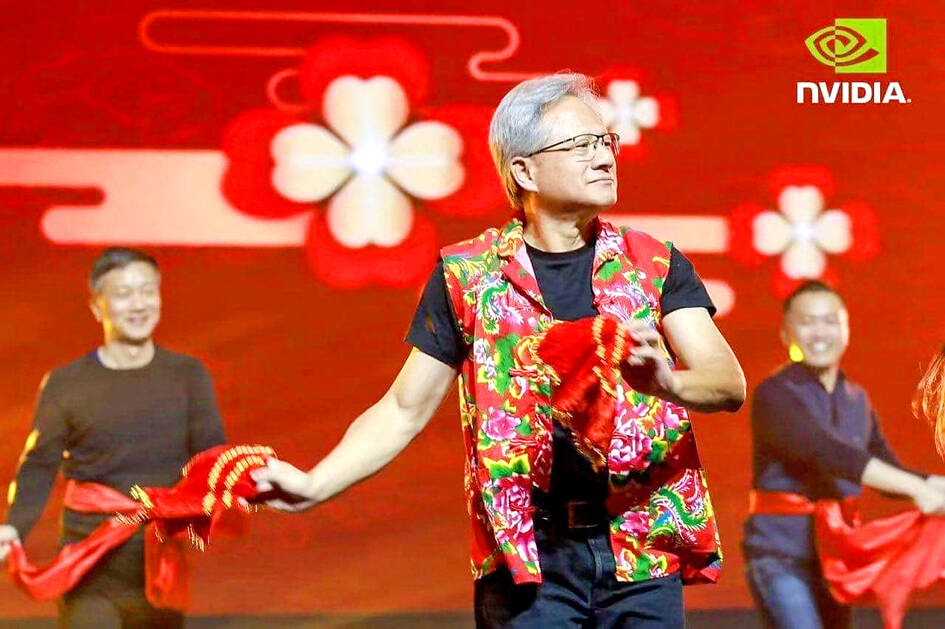Nvidia Corp cofounder Jensen Huang (黃仁勳) celebrated the new year with staff during his first trip to China in four years, a low-key tour that coincided with growing concerns about Beijing’s ability to get around US chip restrictions.
He visited Nvidia’s offices in Shenzhen, Shanghai and Beijing earlier this month, a person familiar with the matter said.
Images and video of the 60-year-old donning colorful traditional Chinese garb and dancing with staff emerged online over the weekend.

Photo: screen grab from Phoenix Television
It was unclear if he had held formal meetings with other executives or officials, said the source, who asked not to be named discussing a private visit.
Huang embarked on his tour — first reported by state newspapers off of Chinese social media posts — as Nvidia’s artificial intelligence (AI) accelerators become pivotal in a tech race between Washington and Beijing.
Huang has warned that an escalation in sanctions designed to cut off the flow of AI training chips could drive Chinese firms to develop their own alternatives.
That could harm US tech leaders in the long run, he said.
The Nvidia cofounder name-checked Huawei Technologies Co (華為) — which last year alarmed Washington by including an advanced made-in-China processor in a smartphone — as a potential rival.
An Nvidia representative confirmed Huang had celebrated the upcoming Lunar New Year with staff, without elaborating.
Nvidia, which more than tripled its market value last year thanks largely to its pivotal role in AI development, is up another 20 percent this year as investors bet on its sector leadership. It has designed versions of its semiconductors for China that it says are compliant with successive rounds of US sanctions, as Washington watches closely.
Among the social media posts, one person describing himself as an Nvidia staffer shared an image of Huang handing over a raffled Nvidia GeForce RTX 4080 graphics card. The CEO has since moved on to Taiwan for his fourth visit to the country in less than a year.

WEAKER ACTIVITY: The sharpest deterioration was seen in the electronics and optical components sector, with the production index falling 13.2 points to 44.5 Taiwan’s manufacturing sector last month contracted for a second consecutive month, with the purchasing managers’ index (PMI) slipping to 48, reflecting ongoing caution over trade uncertainties, the Chung-Hua Institution for Economic Research (CIER, 中華經濟研究院) said yesterday. The decline reflects growing caution among companies amid uncertainty surrounding US tariffs, semiconductor duties and automotive import levies, and it is also likely linked to fading front-loading activity, CIER president Lien Hsien-ming (連賢明) said. “Some clients have started shifting orders to Southeast Asian countries where tariff regimes are already clear,” Lien told a news conference. Firms across the supply chain are also lowering stock levels to mitigate

IN THE AIR: While most companies said they were committed to North American operations, some added that production and costs would depend on the outcome of a US trade probe Leading local contract electronics makers Wistron Corp (緯創), Quanta Computer Inc (廣達), Inventec Corp (英業達) and Compal Electronics Inc (仁寶) are to maintain their North American expansion plans, despite Washington’s 20 percent tariff on Taiwanese goods. Wistron said it has long maintained a presence in the US, while distributing production across Taiwan, North America, Southeast Asia and Europe. The company is in talks with customers to align capacity with their site preferences, a company official told the Taipei Times by telephone on Friday. The company is still in talks with clients over who would bear the tariff costs, with the outcome pending further

Six Taiwanese companies, including contract chipmaker Taiwan Semiconductor Manufacturing Co (TSMC, 台積電), made the 2025 Fortune Global 500 list of the world’s largest firms by revenue. In a report published by New York-based Fortune magazine on Tuesday, Hon Hai Precision Industry Co (鴻海精密), also known as Foxconn Technology Group (富士康科技集團), ranked highest among Taiwanese firms, placing 28th with revenue of US$213.69 billion. Up 60 spots from last year, TSMC rose to No. 126 with US$90.16 billion in revenue, followed by Quanta Computer Inc (廣達) at 348th, Pegatron Corp (和碩) at 461st, CPC Corp, Taiwan (台灣中油) at 494th and Wistron Corp (緯創) at

NEGOTIATIONS: Semiconductors play an outsized role in Taiwan’s industrial and economic development and are a major driver of the Taiwan-US trade imbalance With US President Donald Trump threatening to impose tariffs on semiconductors, Taiwan is expected to face a significant challenge, as information and communications technology (ICT) products account for more than 70 percent of its exports to the US, Chung-Hua Institution for Economic Research (CIER, 中華經濟研究院) president Lien Hsien-ming (連賢明) said on Friday. Compared with other countries, semiconductors play a disproportionately large role in Taiwan’s industrial and economic development, Lien said. As the sixth-largest contributor to the US trade deficit, Taiwan recorded a US$73.9 billion trade surplus with the US last year — up from US$47.8 billion in 2023 — driven by strong